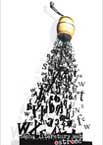Filibert dzieckiem podszyty
“Oh, how one must always anticipate everything!”
Written in 1935, this text was inserted into the novel Ferdydurke, which was first published in 1937. Written in 1935, this text was inserted into the novel Ferdydurke, which was first published in 1937. In 1957, when assembling the new version of his collection of stories, Bacacay, (Wydawnictwo Literackie, Kraków), Witold Gombrowicz decided to include Philidor’s Child Within as well as Philibert’s Child Within.

The short story Philibert’s Child Within is a burlesque description of an unexpected, diabolic suite of incidents that occur over the course of a tennis match at the “Racing Club.” A colonel shoots at the ball, which hurts an onlooker, whose wife slaps another onlooker, while another attacks an innocent bystander, and so on. This absurd chain reaction culminates in general mayhem and ends in a miscarriage. The rhythm evokes a fast-forwarded cartoon or a Chaplin sketch. The humor and cruelty of chance is reflected here in a narrative construction at once simple and extremely precise, whose mechanism corresponds to a verbal and logical tall tale.

Philibert is the name of a saint and a first name of the Savoyard Dynasty of the 15th and 16th centuries. As is always the case with Witold Gombrowicz, this choice represents an onomastic game, with no reference to the text’s contexts whatsoever. This arbitrary state of the author enfolds a humorous aspect into a purportedly realistic story that, in actuality, obeys a fundamental logic of the absurd.
Excerpt: Now, carried away by example, he instantly mounted a woman sitting below him, and she (a minor office clerk from Tangier), surmising that these must be proper city manners and quite the thing to do—also carried him on her back, taking pains to make her movements appear totally relaxed. Excerpt: Now, carried away by example, he instantly mounted a woman sitting below him, and she (a minor office clerk from Tangier), surmising that these must be proper city manners and quite the thing to do—also carried him on her back, taking pains to make her movements appear totally relaxed. Whereupon the more sophisticated sector of the public began to applaud tactfully so as to cover up the gaffe in front of the delegates from foreign consulates and embassies who had thronged to the match. But this led to yet another misunderstanding, because the less sophisticated sector mistook the applause for a sign of approval, and they too mounted their ladies. The foreigners showed increasing astonishment. So what could the more sophisticated sector of the company do? As if nothing had happened, they too mounted their ladies. And this almost certainly would have been the end. But then a certain marquis de Filiberthe, sitting in the grandstand with his wife and her family, was suddenly roused by the gentleman within and stepped into the center of the court in his light-colored summer suit and, pale yet determined, he coolly asked if anyone, and if so who, wished to insult his wife, the marquise de Filiberthe? And he threw into the crowd a bunch of visiting cards inscribed: Philippe Herta de Filiberthe. (Oh, how terribly careful we must be! How difficult and treacherous life is, and how unpredictable!) Dead silence ensued. As it appears in Borchardt’s translation of Ferdydurke.
Excerpt: And all at once, at a walk, bareback, on slender-fetlocked, elegant, fashionably dressed women, no fewer than thirty-six men began to ride up to the Marquise de Philibert so as to insult her and remember that they were gentlemen, since her husband, the Marquis, had remembered that he was a gentleman. She in turn, out of fright, gave birth prematurely—and the whimpering of the child was heard at the Marquis’s feet beneath the heels of the trampling women. The Marquis, so unexpectedly finding a child within, provided with an complemented by a child just as he had stepped out alone as a grown and self-sufficient gentleman—became embarrassed and went home—while thunderous applause rang out from the spectators. As it appears in Johnston’s translation of the story in Bacacay.





